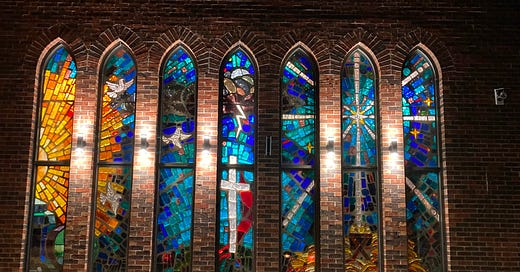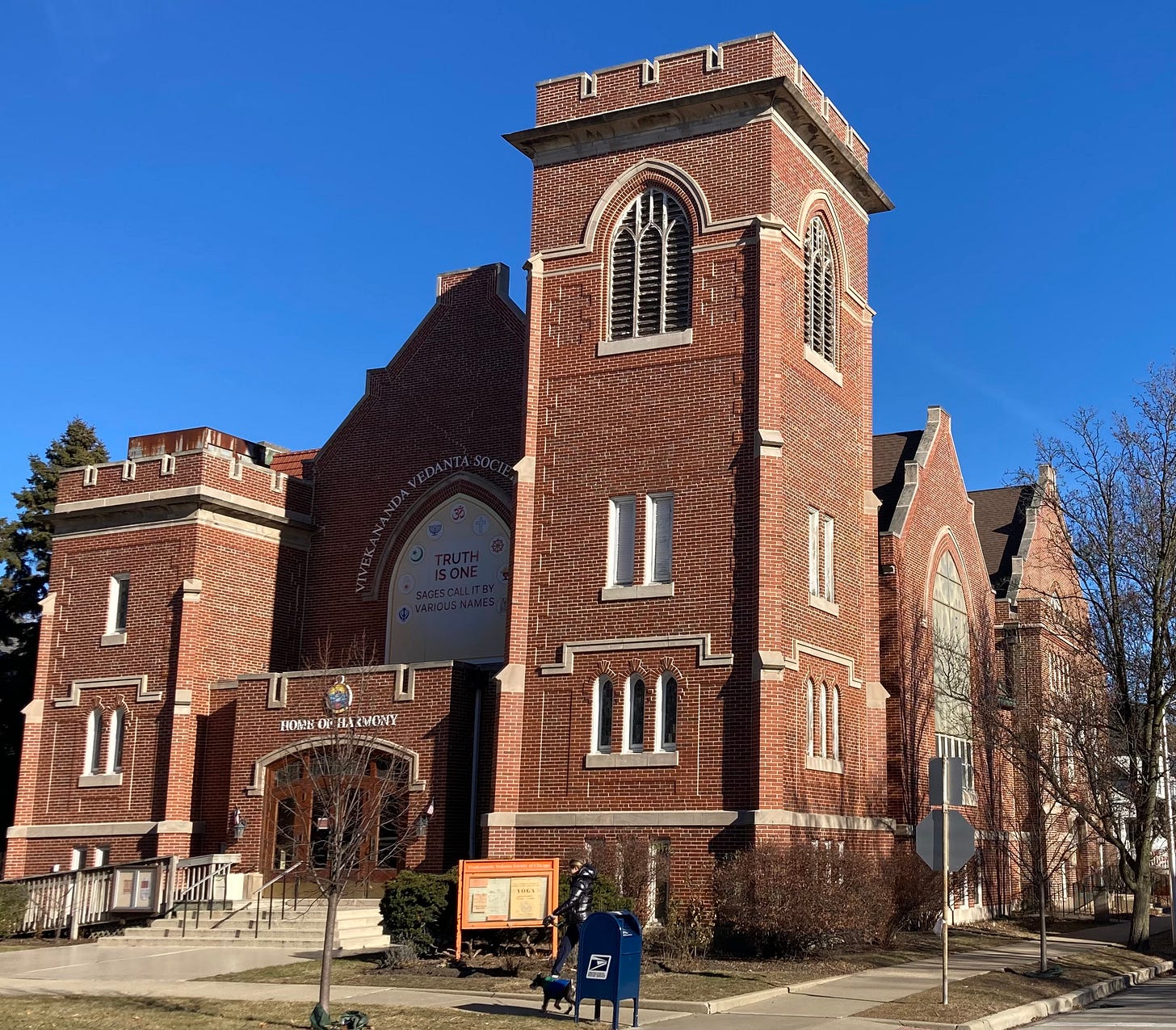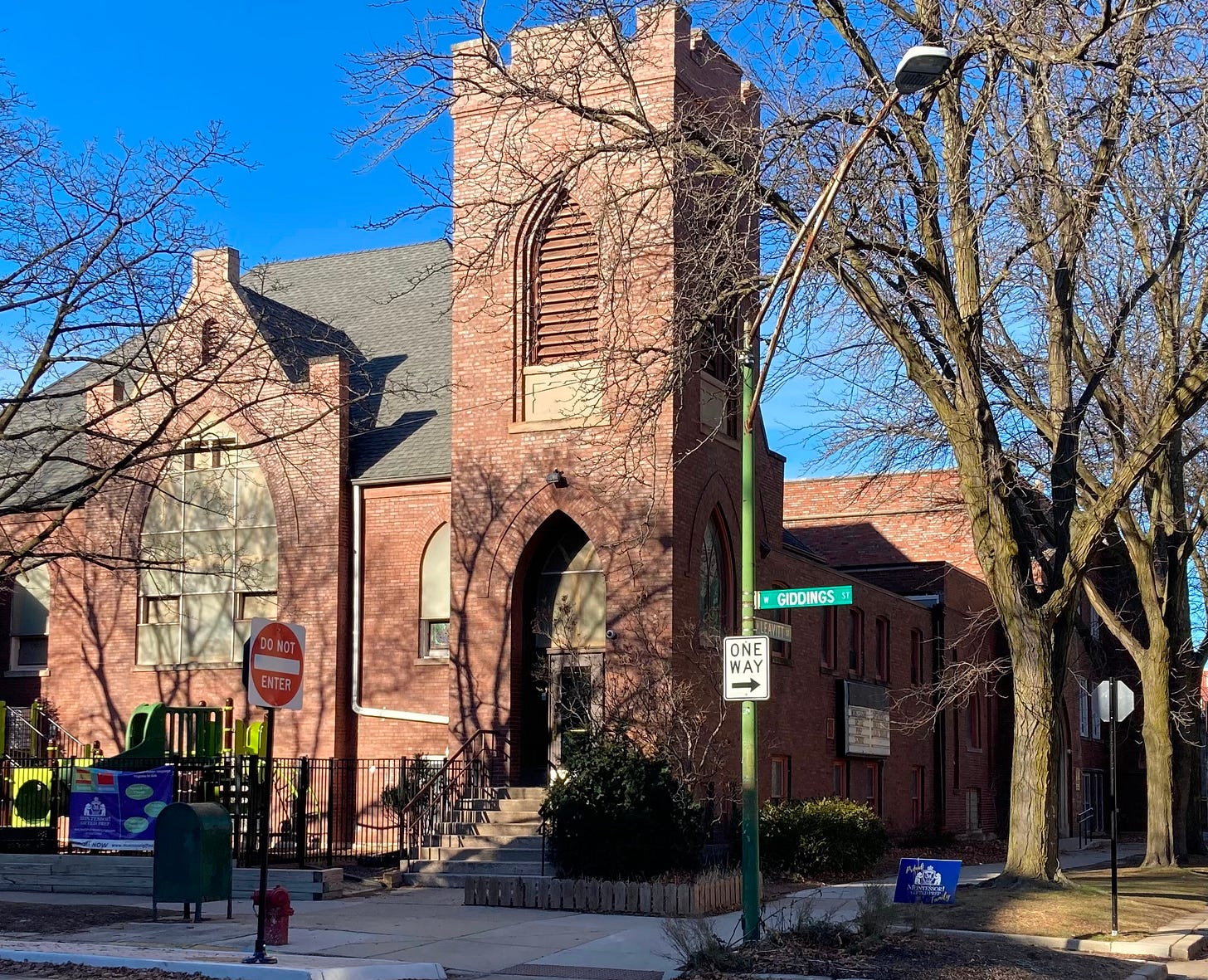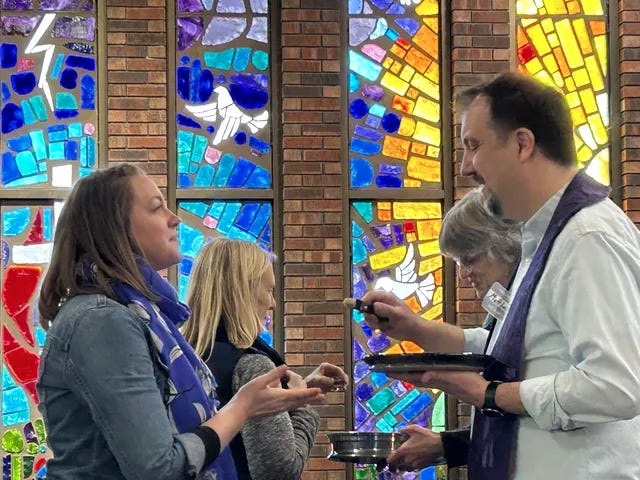Shrinking Chicago Methodists sell, merge, move
After contending with COVID as well as Methodism's conflict over human sexuality and other changes, a new Albany Park congregation faces another challenge: lack of kids.
Chicago's United Methodist Churches are trying consolidation as more and more congregations become too small to hang on alone.
The Albany Park Ministry Center — the new home of the former Berry UMC in Lincoln Square, the former Irving Park/Big Shoulders UMC, and the First Vietnamese UMC of Albany Park — is the first such experiment.
For now, Chicago remains home to nearly four dozen Methodist Churches, but like thousands of other houses of worship across the country, the fate of many is up in the air.
"We have a lot of small congregations," said Mike Jones, retired director of Church Properties Reimagined (CPR). "You need 75 to 100 (members) to be able to pay the bills. Most congregations are less than 50, and some are down to 30. We have a lot of churches that can't really afford their buildings now. They're too big and costly. They were built for 300 to 400 worshipers."
One pastor at the new ministry center, on Wilson Avenue east of Kedzie Avenue, has led his congregation through dramatic change: COVID, homelessness, worshiping at a pizzeria, merger, relocation, and Methodism's conflict over LGBTQ+ rights. One of the next challenges is the absence of children.
The center occupies a recently renovated church dating only to 1971. If not for its stained-glass windows and signage, the one-story, flat-roofed brick building, lacking a steeple, could be mistaken for a small elementary school. It was last owned and occupied by the First Vietnamese UMC before dwindling membership and the pandemic left it vacant and in need of repair.
As it sat empty, the church's roof leaked and the basement flooded, boiling the electrical panel; mold started taking over; a graffitist drew on the wall behind the pulpit in the main worship room, and the letters on the original United Methodist Church of Albany Park sign on the front of the building started falling upside down.
CPR came to the rescue. (The non-profit Methodist organization's name predates Jones, so he doesn't know whether the acronym's reference to emergency resuscitation was deliberate or not).
First Vietnamese UMC donated the church to CPR. That organization funded a complete renovation last year, using proceeds from the sale of the hulking Berry and Big Shoulders legacy churches and the historically valuable Epworth UMC in Edgewater.
When Epworth's membership fell to a dozen or so, that 19th-century landmark was sold to Barakah Chicago, a Muslim association — after demolition and condo-development plans fell through.
Berry and Big Shoulders, each featuring a tower/beacon and connected to other church buildings, both had operated for more than a century. Berry was sold to a Montessori school. Big Shoulders became Home of Harmony — a Vedanta Society, rooted in an ancient religious philosophy of India that welcomes all religions.
Berry and Big Shoulders merged into a new, LGBTQ+-affirming congregation, called Renewed Hope UMC, that has been a welcome addition to the new ministry center in East Albany Park, according to neighbors.
"CPR leadership had the idea of a ministry center, where multiple churches share one location to lessen expenses for smaller congregations, and they can focus on ministry and community without having to worry about and spend energy on maintenance, upkeep and ongoing expenses," Jones said. "CPR owns the building, and right now both churches each pay $1,400 a month in rent, including maintenance and utilities. We also rent parking spaces to neighbors for $1,400 a month, so CPR income totals $4,200 a month. We set aside $1,700 of that per month for future capital improvements."
As a ministry center, the building has the opportunity to be used by the community, for example by another non-profit during the week as, say, an adult day-care center or a counseling site, Jones went on.
Already, Renewed Hope is teaching English to Central American refugees as well as providing them Welcome to America packs.
The church also has opened its doors to a neighborhood association meeting, lectures by a veteran civil rights leader and others, a book club where members discussed a work written by the first openly gay Methodist bishop; marched in the Chicago Pride Parade; conducted regular dementia-friendly worship services at a nursing home; operated booths at a local block party and farmers markets; held letter-writing parties to encourage voter turnout; raised funds for Boy Scout sex-abuse victims; wrapped gifts for traumatized children; and handed out Halloween treats.
To that growing list of civic participation, neighborhood activist Adam Sebastian added Renewed Hope's serving as host of a local foundation's Christmas tree- and ornament-decorating event aimed at preventing gun violence.
The church "seems very willing to be engaged in the neighborhood," and it's "great to see the space active and used regularly," Sebastian said.
Renewed Hope Pastor Matthew Krings has led Berry/Irving Park through dramatic changes — COVID, merger, relocation, and Methodism's conflict over human sexuality — since his assignment to Berry in mid-2020.
"I was tasked with getting to know a congregation pretty much via Zoom video meetings and phone calls," he told me last summer. "People were even afraid to talk outside with masks on. It was a very scary time." Members conducted services in the park for a while, and then, during a "homeless" period after the church was sold, worshiped at Borelli's Pizza.
‘This was political’
Krings cited debate over LGBTQ+ rights as one reason for church membership decline. Gay clergy, same-sex marriage and other liberal stances prompted a fourth of Methodist churches, mostly conservative congregations in the South, to break away from the denomination in recent years.
"I know this stuff wasn't all internal," nor did it happen by accident, Krings said. Starting decades ago, homosexuality "was fomented as a wedge issue by outside powers," by conservatives, "to kneecap" liberal churches "and their impact at the ballot box," he went on. "They didn't want the Methodist church to have the impact on society that it had. This was political."
The UMC's lawmaking General Conference finally changed its policy on LGBTQ+ inclusion in 2024. But by then damage already had been done to local churches like Berry and Irving Park that had long been passionate about gay rights.
"If you've got a congregation that's excited for change and the global body says 'no,' that group has the wind pulled out of its sails," Krings said. "When that happens again and again and again, people say 'why stay here?' "
Yet, enough members remained between the two churches to provide "renewed hope for our future, now that we don't have to argue over this thing that we've been arguing about," Krings said. "Think of all the time and money and effort that we've spent on this for years and years and years. Hopefully, we're done with that. That's why we're called Renewed Hope."
Churches are becoming "smaller all over the place because they've become irrelevant — because they are focused on things other than the Gospel," Krings said. "To me, the Gospel is about God's incredible love, stepping into human existence again, again and again to say ... I made you in my image ... I love you ... I care for you ... I will save you from harms of your own making."
Other factors contributing to decreased church attendance, Kring says, include church abuse scandals and the longstanding national decline in membership in civic organizations that meet face-to-face, such as the Elks.
"People used to join things as a way to be connected," the pastor said. "People connect in different ways now, and they don't join things in the same way they did."
Media, public opinion and other research further attributes the decline in religiosity to liberals, young people, singles, demanding jobs, caring for aging parents, kids' sports on weekends, pastors' lack of business skills, divorce rates, politics and more.
No steeple or little people
One religious leader has noted that children who do not attend church while growing up will never have a church to go back to when they become adults.
Retiree Donald Ames — who lives down the street from Renewed Hope and worried that the church might be destroyed for condos after sitting empty — enjoys reading a Sunday newspaper at his single-family home on Sunday mornings.
In an interview at Khepri Cafe coffee shop, where Krings happens to maintain office hours, Ames recalled never missing Sundays in church while growing up American Baptist in the Niagra Falls area.
If they don't go to Sunday school, Ames wonders whether some children today will learn right from wrong.
Meanwhile, a youth pastor has been quoted as saying, "A church that has no children is terminal."
When I asked Krings about the apparent lack of children at Renewed Hope during my visits, he said, "Most of our families, their kids are either grown up or they don't have kids."
If anyone has the education, training and experience to usher children into a church, it could be Krings. He and his wife met when they were youth ministers at a retreat for high-schoolers. Krings, who grew up Catholic in Milwaukee, majored in elementary education at the private North Central College in Naperville. The school is affiliated with the Methodist church.
During all four years of college, Krings belonged to a campus ministry group that would sing at local Methodist churches on Sunday mornings. One of his fellow freshman choir members was future mayor Brandon Johnson, who had to drop out of the college to help take care of younger siblings back in Chicago, after his mother died. Krings was one of the few choir members chosen to be leaders of Methodist summer camps and vacation Bible schools.
"I realized my passion was to teach more than just ABC's and 1,2,3's," he recalled. That led to a job after graduation as a youth minister.
"We're going to get there," Krings said in reference to seeing children in church again, noting that his congregation has been busy withstanding dramatic changes over the past four-plus years.








We are lucky to have these progressive, equity- and empathy-driven Christians doing thoughtful community building in our neighborhood! Great writing, Seth!
Shoe leather reporting and good writing in my own neighborhood?! I'm thrilled to see this. Best of luck on this endeavor, Seth. I hope to read a whole lot more.